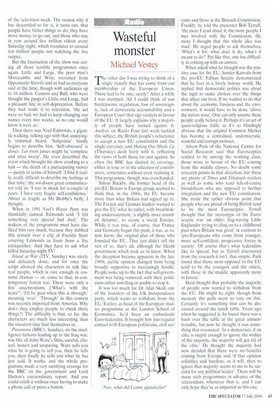Wasteful monster
Michael Vestey
The other day I was trying to think of a single benefit that has come from our membership of the European Union. There had to be one, surely? After a while I was stumped. All I could think of was burdensome regulation, loss of sovereignty, lack of democratic accountability and a European Court that rigs verdicts in favour of the EU. It largely explains why a majority of people have turned against it. Analysis on Radio Four last week tackled this subject, the British people's reluctance to accept a new EU constitution and the single currency; and Making Our Minds Up (Thursday) dealt fairly with it, reflecting the views of both those for and against. So often the BBC has slanted its coverage, either in tone or in the selection of contributors, sometimes without even realising it. This programme, though, was even-handed.
Simon Buckby, the former head of the pro-EU Britain in Europe group, seemed to think that, in the 1980s, the EU became more than what Britain had signed up to. The French and German leaders wanted to give the EU what he called, with breathtaking understatement. 'a slightly more rounded dynamic', to create a social Europe. While it was true, of course, that France and Germany began this push, it was, as we now know, the original plan of those who founded the EU. They just didn't tell the rest of us, that's all, although the Heath government which took us in knew. When the deception became apparent in the late 1980s, public opinion changed from being broadly supportive to increasingly hostile. People woke up to the fact that self-government was being removed, with their politicians either unwilling or unable to stop it.
It was too much for Dr Alan Skecl, one of the founders of the UK Independence party, which wants to withdraw from the EU. Earlier, as head of the European studies programme at the London School of Economics, he'd been an enthusiastic Euro-federalist. It brought him into regular contact with European politicians, civil ser vants and those at the Brussels Commission. Frankly, he told the presenter Bob Tyrrell, 'the more I read about it, the more people I met involved with the Commission, the more I thought that this whole idea was mad'. He urged people to ask themselves, 'What's it for, what does it do, what's it meant to do?' Put like that, one has difficulty in coming up with an answer.
When asked what he thought was the positive case for the EU, Sunder Katwala from the pro-EU Fabian Society demonstrated that he lives in a lovely fantasy world. He replied that democratic politics was about the right to make choices over the things that affect our lives. If we wanted to do that about the economy, business and the environment, it would have to be done 'above the nation state'. One can only assume these people really believe it. Perhaps it's an act of quasi-religious faith, as it's so blindingly obvious that the original Common Market has become a centralised, undemocratic, wasteful and corrupt monster.
Alison Park of the National Centre for Social Research said that Eurosceptics tended to be among the working class, those more in favour of the EU coming from the middle classes. No doubt some research points in that direction, but there are plenty of Times and Telegraph readers as well as some who read left-of-centre broadsheets who are opposed to further integration and the new EU constitution. She made the rather obvious point that people who are proud of being British tend to be the most Eurosceptic. Tyrrell thought that the stereotype of the Eurosceptic was 'an older, flag-waving Little Englander trying to cling on to a childhood past when Britain was great' in contrast to 'pro-Europeans who come from younger, more self-confident, progressive forces in society'. Of course that's what federalists like to spread, but as Tyrrell discovered from the research it isn't that simple. Park found that those most opposed to the EU tend to be the youngest and the oldest, with those in the middle apparently more in favour.
Sked thought that probably the majority of people now wanted to withdraw from the EU. He might be right, though from memory the polls seem to vary on this. Certainly it's something that can be discussed around the lunch table. Years ago when he suggested it, he found there was a hush over the table at the great unmentionable, but now he thought it was something that resonated, 'In a democracy, if an elite is stupid enough to ignore the wishes of the majority, the majority will get rid of the elite.' He thought the majority had now decided that there were no benefits coming from Europe and 'if that opinion solidifies and hardens, as it will, then to ignore that majority seems to me to be suicidal for any political leader'. There will be many such programmes in advance of the referendum, whenever that is, and I can only hope they're as impartial as this one.


























































 Previous page
Previous page